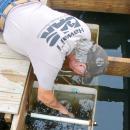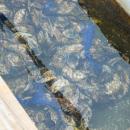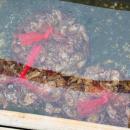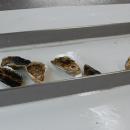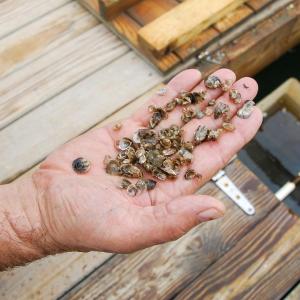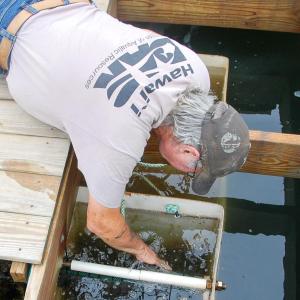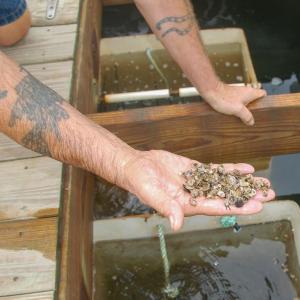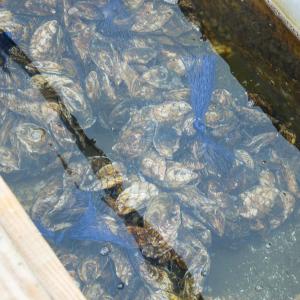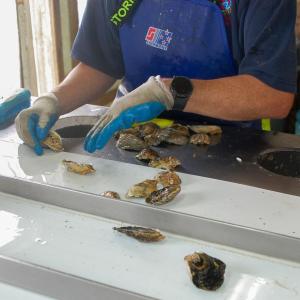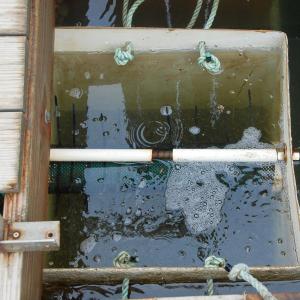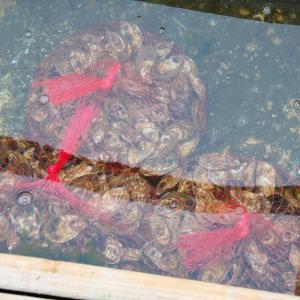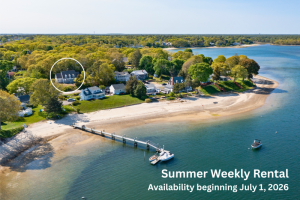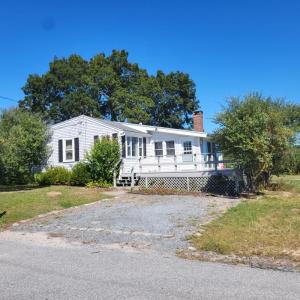Seafood setbacks: Tri-town shellfishers at risk due to pollution, strict regulations
 Dale Leavitt with a handful of oyster seed.
Dale Leavitt with a handful of oyster seed. Dale Leavitt digs for oyster seed in the hatchery.
Dale Leavitt digs for oyster seed in the hatchery.  Dale Leavitt holds more oyster seed.
Dale Leavitt holds more oyster seed.  Fully mature oysters ready to be picked up for delivery.
Fully mature oysters ready to be picked up for delivery. Lacy Berman cleans shellfish before she places them on a conveyor belt.
Lacy Berman cleans shellfish before she places them on a conveyor belt.  Oysters continue on a conveyor belt after being cleaned.
Oysters continue on a conveyor belt after being cleaned.  Freshly caught oysters enter a hopper to be cleaned then sorted by size.
Freshly caught oysters enter a hopper to be cleaned then sorted by size.  Water circulates through an oyster hatchery.
Water circulates through an oyster hatchery. These oysters will be refrigerated then delivered fresh to regional buyers.
These oysters will be refrigerated then delivered fresh to regional buyers.  These fresh oysters will be sold as petite or large at the market depending on their size.
These fresh oysters will be sold as petite or large at the market depending on their size. 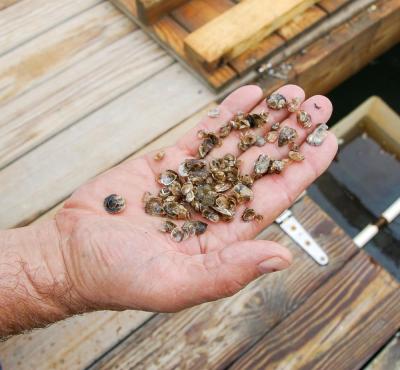 Dale Leavitt with a handful of oyster seed.
Dale Leavitt with a handful of oyster seed.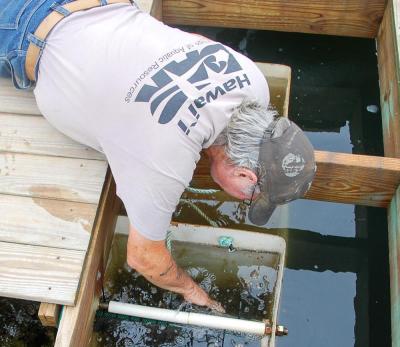 Dale Leavitt digs for oyster seed in the hatchery.
Dale Leavitt digs for oyster seed in the hatchery.  Dale Leavitt holds more oyster seed.
Dale Leavitt holds more oyster seed. 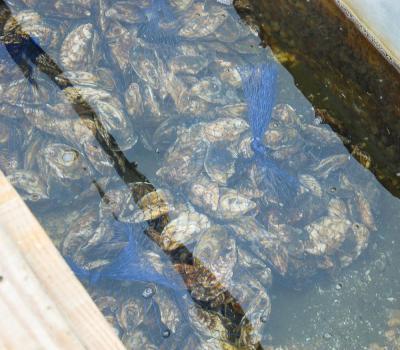 Fully mature oysters ready to be picked up for delivery.
Fully mature oysters ready to be picked up for delivery.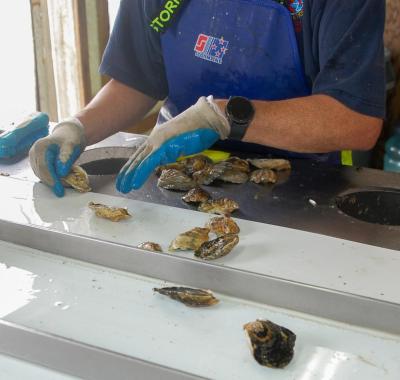 Lacy Berman cleans shellfish before she places them on a conveyor belt.
Lacy Berman cleans shellfish before she places them on a conveyor belt. 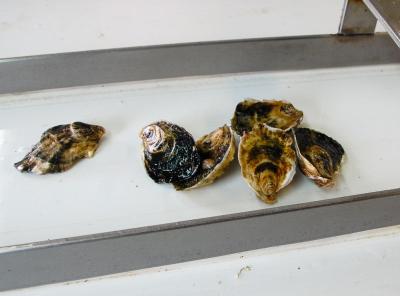 Oysters continue on a conveyor belt after being cleaned.
Oysters continue on a conveyor belt after being cleaned. 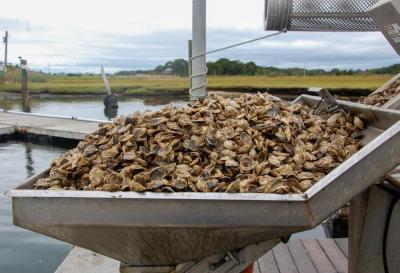 Freshly caught oysters enter a hopper to be cleaned then sorted by size.
Freshly caught oysters enter a hopper to be cleaned then sorted by size. 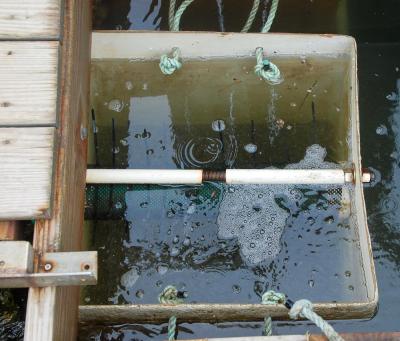 Water circulates through an oyster hatchery.
Water circulates through an oyster hatchery.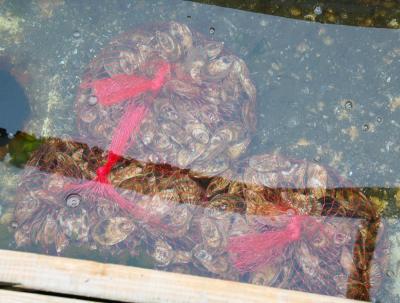 These oysters will be refrigerated then delivered fresh to regional buyers.
These oysters will be refrigerated then delivered fresh to regional buyers.  These fresh oysters will be sold as petite or large at the market depending on their size.
These fresh oysters will be sold as petite or large at the market depending on their size. MATTAPOISETT — Dale Leavitt, owner of Blue Stream Shellfish, was closed for 180 days in 2024 due to stricter regulation of commercial shellfishing in Massachusetts. It “pretty much killed business,” he remembers.
“We were losing about $10,000 a week. We probably lost $150,000,” said Leavitt, who has oyster farms in Mattapoisett and Fairhaven.
The new regulations were introduced in January of 2024 by the U.S. Food and Drug Administration and implemented in Massachusetts by the Division of Marine Fisheries.
The federal regulations reduced the allowable levels of contaminants in shellfish.
The primary source of contamination in Buzzards Bay is aging municipal sewage systems that spew inadequately treated waste into the Bay during heavy rainfall.
In implementing the new standards, state regulators have opted to close areas to shellfishing after heavy rainfall rather than waiting for testing to reveal contamination before closing these areas.
“The limits and the regulations around [shellfishing] are pretty stringent and they're getting tighter every year,” said Mattapoisett Harbormaster Isaac Perry.
“[Massachusetts has] 400 oyster farmers here. We're generating $20 million a year probably,” said Leavitt.
Shellfish beds can be contaminated with pollutants from a variety of sources including boats, runoff from roads and farms near the shore and naturally occurring bacteria outbreaks. The main offender is “combined sewage overflows.”
Referred to as “CSOs” the overflows are the result of antiquated drainage systems dumping extra water into sewage treatment facilities already operating at full capacity. The overflow of runoff and untreated sewage has nowhere to go other than the Bay.
Contributing to the Tri-Town shellfish problems are the Marion and New Bedford sewage plants.
“It's a frustrating problem because there really is no fix and it's just being dumped upon these growers,” said Perry.
“Eventually it's just gonna force [aquaculture farmers] out of business because you just can't maintain the business when you shut down for a third or half of your time.”
Fixing the sewage infrastructure of New Bedford would be very expensive.
“Last I heard it was somewhere between 1.2 and 1.6 billion dollars to improve parts of New Bedford’s sewage systems,” Leavitt explained.
“These sort of rainfall closures [are] directly related to the levels of fecal coliform,” stated Vincent Malkoski, Chair of the Marion Marine Resources Commission.
High fecal coliform levels can cause “vibrio cholerae” infection in shellfish and be transmitted to humans through consumption, leading to risk of cholera infection. This infection can cause diarrhea, vomiting and even death if untreated.
After the closures, Leavitt stated that “We can't harvest anything for a minimum of seven days and a maximum of twenty-one days.”
Like many other shellfishers, Leavitt harvests all year long.
“This year hasn't been as rainy so we've only been closed for 40 days so far this year. Which is still a hardship, but we can survive with that,” said Leavitt.
Some farmers have been forced to close their business this year, like Mike Ward who owns Mattapoisett Oysters.
Shellfishing is managed by two levels in Massachusetts. Commercial shellfishing is managed by the state through the Division of Marine Fisheries while recreational harvest is managed by the towns.
Malkoski said the closures are about protecting human health and safety.
“These closures happen to protect the people who may eat that shellfish,” he said, “Some of the consequences of eating contaminated shellfish range from a couple of days sitting on the toilet to serious diseases.”
“A person who has a compromised system or an older person may not be able to adjust to having that bacteria roaming around their body.”
Leavitt is hopeful that change can be made. “The secret to fixing all of this is to fix the [sewage overflow],” he said.
“We have been working with our legislators and there is a piece of legislation that has been proposed that will put together a committee to investigate and identify potential funding sources so that we can fix these things.”
Ironically, oysters serve their habitats by filtering up to 50 gallons of water a day.
Bob Field, a Mattapoisett oyster farmer of 15 years said oysters are “both taking algae out of the water and increasing the water clarity and water quality. That's helping against potential algae blooms.”
“Hopefully being able to get those CSOs eliminated would be great not just for us, but everybody else who enjoys Buzzards Bay.”














